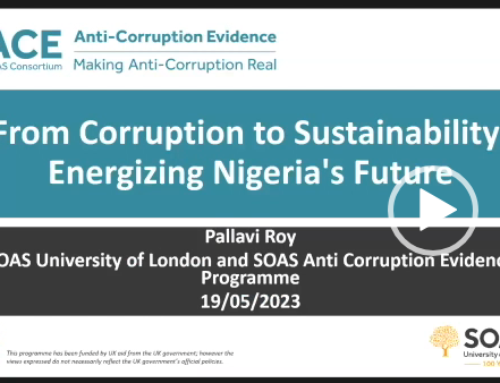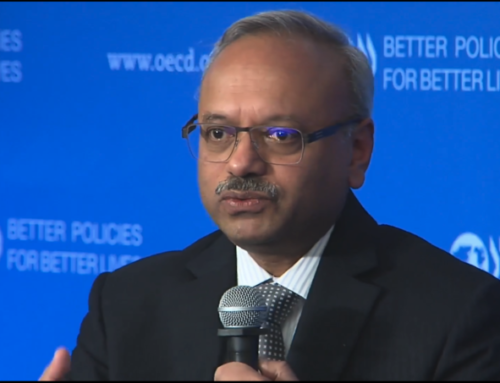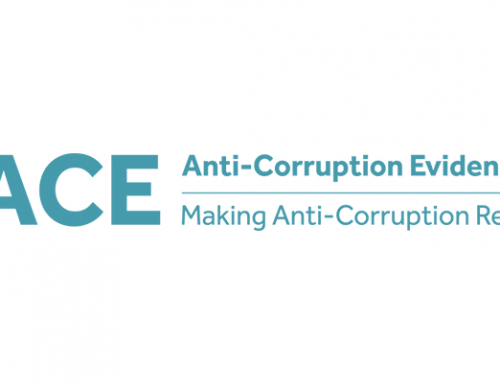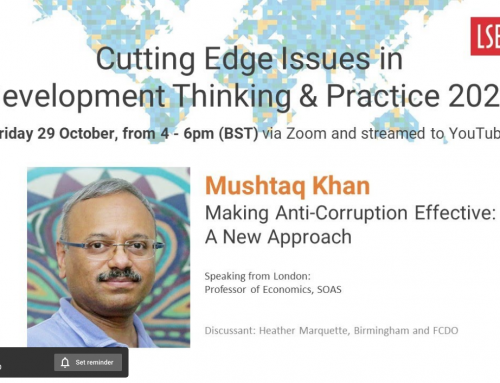
In 2015 Muhammadu Buhari swept to victory in Nigeria’s Presidential elections on an electoral ticket strongly featuring a tough stance on corruption. A month ago, Nigerians again rejected an alternative approach offered to support Buhari’s mandate for change. Yet so far, his methods seem to have had little effect. Will another term make a difference? Post-election, Dr Joseph Ajefu, Research Fellow for the Anti-Corruption Evidence Research Consortium, reflects on two very different approaches to tackling Nigeria’s corruption.
The keenly contested presidential elections in February saw Nigerians offered, among other things, a choice between two very different ways of tackling the corruption in the country.
The stiff political contest was largely due to the challenge thrown down by other candidates to the incumbent, President Muhammadu Buhari, who had swept to power on an anti-corruption platform in his election campaign in 2015. The campaign worked largely because the electorate perceived corruption to be one of the key failings of the then President Goodluck Jonathan’s government. However, stagnating economic growth and disruptive regional conflicts had subsequently overshadowed the Buhari government’s anti-corruption efforts.
During the build-up to the 2019 elections, Nigerians were presented with divergent views on anti-corruption strategies by over seventy presidential candidates. However, the candidates who obviously caught the attention of most Nigerians were from the two main political parties—Buhari from the incumbent All Progressives Alliance (APC) and Atiku Abubakar from the main opposition party, the People’s Democratic Party (PDP).
Atiku, President Buhari’s main opponent, proposed a liberal anti-corruption strategy that included granting of amnesty to those with corruption charges in order to help recover billions of dollars embezzled from the country. It also involved a highly controversial proposal to completely privatise the Nigerian National Petroleum Corporation (NNPC). The NNPC is Nigeria’s state owned oil and gas corporation and responsible for regulating the managing the sector in Nigeria. However, his approach to corruption did not resonate strongly with ordinary Nigerians. Many had concerns that his approach could create a culture of impunity and amplify corruption by the country’s political class and powerful elites. The massive corruption under the PDP government prior to 2015, especially with regard to the oil and gas sector, lend credence to their skepticism.
On the other hand, Mr Buhari, who gained significant political capital in 2015, maintains a tough posture on corruption, which contributed strongly to his victory. Yet after almost four years in power, Mr Buhari’s anti-corruption strategy has not yielded the desired outcome. The Economic and Financial Crimes Commission (EFCC), and other government anti-corruption agencies, have failed to claim many high-profile convictions. And a February 2019 Gallup poll found that 84 percent of Nigerians think that government corruption is widespread, and likely down by just 2 percentage points from 2014. Meanwhile, some critics argue that Buhari’s anti-corruption policy is a subtle ‘political witch-hunt’ targeted mainly at political opponents and members of opposition parties.
Using policies based on rule of law alone to fight corruption seems unlikely to yield results. In the face of intransigent corruption, and an entrenched Presidential view about how best to tackle it, how to break the impasse?
Effective enforcement or systemic anti-corruption strategy has been difficult to achieve in Nigeria for the following reasons. First, most private businesses in Nigeria can carry out their activities informally and can generate benefits for themselves and their families through political connections – they do not need to rely on rule of law in order to get business done. Second, the last few years after the return of democracy have witnessed the rise of political ‘entrepreneurs’ who owe little by way of political affiliations and change parties frequently, bringing with them the ability to mobilise resources and voter support. Enforcement of formal rules is difficult in such contexts.
The pertinent question remains, with politics what they are, what can feasibly be done about corruption? Our SOAS-ACE studies, in partnership with several Nigerian research institutes, shows that effective anti- corruption requires two mutually inclusive factors: policies have to be based on horizontal enforcement rather than top down enforcement by legal agencies alone. This involves productive and powerful groups and individuals in specific sectors of the economy believing it is in their interests to adhere to rules. This can be complemented by rule of law reforms. Buhari has so far focused on the second and ignored the first. What could it mean in practice?
The powerful have no incentive currently to enforce rules on themselves and their peers – but incentives can be changed. The central idea entails carefully identifying critical sectors where changes in the structure of incentives could trigger productive behaviour from key stakeholders. For example, in the Nigerian health sector, to reducing corruption would require identifying and implementing policies that remove incentives for ineffective and inappropriate health care, such as absenteeism, diverting patients to private facilities, and informal charging of patients. Addressing these concerns with the appropriate structure of incentives will lead to better health care delivery for patients.
The success of this strategy, to a large extent depends on policy makers in the government having a clear understanding of why private and public organisations are engaged in corrupt practices. For sure there will be some sectors, like the oil and gas sector, where reducing corruption will be difficult. However, there are others where private incentives to reduce corruption are high coupled with political interest, for instance in the country’s power sector or with recent reforms in fertiliser subsidies. There are some signs so far that Buhari and his administration are open to a new way of doing things – and this is critical because without some change, Nigerians have little to look forward to on corruption than more of the same.






